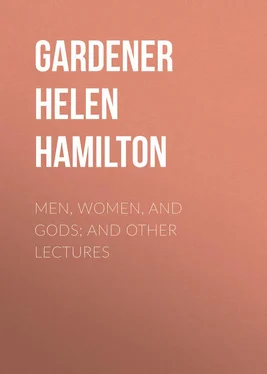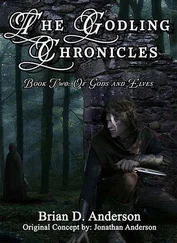Helen Gardener - Men, Women, and Gods; and Other Lectures
Здесь есть возможность читать онлайн «Helen Gardener - Men, Women, and Gods; and Other Lectures» — ознакомительный отрывок электронной книги совершенно бесплатно, а после прочтения отрывка купить полную версию. В некоторых случаях можно слушать аудио, скачать через торрент в формате fb2 и присутствует краткое содержание. Жанр: foreign_antique, foreign_prose, на английском языке. Описание произведения, (предисловие) а так же отзывы посетителей доступны на портале библиотеки ЛибКат.
- Название:Men, Women, and Gods; and Other Lectures
- Автор:
- Жанр:
- Год:неизвестен
- ISBN:нет данных
- Рейтинг книги:3 / 5. Голосов: 1
-
Избранное:Добавить в избранное
- Отзывы:
-
Ваша оценка:
- 60
- 1
- 2
- 3
- 4
- 5
Men, Women, and Gods; and Other Lectures: краткое содержание, описание и аннотация
Предлагаем к чтению аннотацию, описание, краткое содержание или предисловие (зависит от того, что написал сам автор книги «Men, Women, and Gods; and Other Lectures»). Если вы не нашли необходимую информацию о книге — напишите в комментариях, мы постараемся отыскать её.
Men, Women, and Gods; and Other Lectures — читать онлайн ознакомительный отрывок
Ниже представлен текст книги, разбитый по страницам. Система сохранения места последней прочитанной страницы, позволяет с удобством читать онлайн бесплатно книгу «Men, Women, and Gods; and Other Lectures», без необходимости каждый раз заново искать на чём Вы остановились. Поставьте закладку, и сможете в любой момент перейти на страницу, на которой закончили чтение.
Интервал:
Закладка:
7 And her husband heard it , and held his peace at her in the day that he heard it ; then her vows shall stand, and her bonds wherewith she bound her soul shall stand.
8 But if her husband disallowed her on the day that he heard it ; then he shall make her vow which she vowed, and that which she uttered with her lips, wherewith she bound her soul, of none effect: and the Lord shall forgive her.
9 But every vow of a widow, and of her that is divorced, wherewith they have bound their souls, shall stand against her.
10 And if she vowed in her husband's house, or bound her soul by a bond with an oath;
11 And her husband heard it , and held his peace at her, and disallowed her not; then all her vows shall stand, and every bond wherewith she hound her soul shall stand.
12 But if her husband hath utterly made them void on the day he heard them ; then whatsoever proceeded out of her lips concerning her vows, or concerning the bond of her soul, shall not stand: her husband hath made them void; and the Lord shall forgive her.
13 Every vow, and every binding oath to afflict the soul, her husband may establish it, or her husband may make it void.
14 But if the husband altogether hold his peace at her from day to day; then he establisheth all her vows, or all her bonds, which are upon her: he confirmeth them, because he held his peace at her in the day that he heard them.
15 But if he shall any ways make them void after that he hath heard them; then he shall bear her iniquity.
16 These are the statutes, which the Lord commanded Moses, between a man and his wife, between the father and his daughter, being yet in her youth in her father's house.
Between man and his God they tell us there is no one but a Redeemer; but between woman and man's God there seems to be all her male relations, which, I should think, would prevent any very close intimacy. And by the time the divine commands to woman were filtered through the entire male population, from Moses to the last gentleman who, in the confusion natural to the occasion, misquotes "with all thy worldly goods I me endow," I should think it not impossible that some slight errors may have crept in, and the Church should not feel offended if I were to aid her in their detection.
Here we have two or three passages that are said to be the words of Jesus. I hope that is not true. But I, believing him to have been a man, can understand how they might have been the words of even a very good man in that age and with his surroundings; but the words of a perfect being – never! Of course I know that we have no positive knowledge of any of the words of Jesus, since no one pretends that they were ever written down until long after his death; but I am dealing now with the theological creation upon the theologian's own grounds. My own idea of Jesus places him far above the myth that bears his name.
3 And when they wanted wine, the mother of Jesus saith unto him, They have no wine.
4 Jesus saith unto her, Woman, what have I to do with thee?
– John ii, 3-4.
I hope that Christ did not say that – for his manhood I hope so. I would rather believe that this is the mistake of some "uninspired" writer than think that one who in much had so gentle and tender a nature, was unkind and brutal to his mother. No one would attempt, in this age, to apologize for such a reply to so simple a remark made by a mother to her son. But they say "he was divine." They also tell us he was a perfect example; but with this evidence before me, I am glad our men are human. Still I cannot pretend to say that this is not divine – never having made any divine acquaintances. I can only say, humanity is better.
Then again he is reported to have said a most cruel thing to the broken-hearted mother of a dying child, and I would rather believe the Bible uninspired and keep my respect for Jesus, the man. It will be better for this world to believe in Jesus, the brave, earnest man, than in Jesus, the cruel God.
21 Then Jesus went thence, and departed into the coasts of Tyre and Sidon.
22 And behold, a woman of Canaan came out of the same coasts, and cried unto him, saying, Have mercy on me, O Lord, thou Son of David; my daughter is grievously vexed with a devil.
23 But he answered her not a word.
25 Then came she and worshiped him, saying, Lord, help me.
26 But he answered and said, It is not meet to take the children's bread, and to cast it to dogs.
27 And she said, Truth, Lord: yet the dogs eat of the crumbs which fall from their masters' table.
– Matt. xv.
Do you think that was kind? Do you think it was godlike? What would you think of a physician, if a woman came to him distressed and said, "Doctor, come to my daughter; she is very ill. She has lost her reason, and she is all I have!" What would you think of the doctor who would not reply at all at first, and then, when she fell at his feet and worshiped him, answered that he did not spend his time doctoring dogs? Would you like him as a family physician? Do you think that, even if he were to cure the child then, he would have done a noble thing? Is it evidence of a perfect character to accompany a service with an insult? Do you think a man who could offer such an indignity to a sorrowing mother has a perfect character, is an ideal God? I do not. And I hope that Jesus never said it. I prefer to believe that that story is a libel.
It won't do. We have either to give up the "inspiration" theory of the Bible, and acknowledge that it is the work of men of a crude and brutal age, and like any other book of legend and myth of any other people; or else to give up the claim that God is any better than the rest of us. You can take your choice.
Whenever a theologian undertakes to explain matters so as to keep the Bible and the divine character both intact, I am always reminded of the story of the Irishman who was given a bed in the second story of a lodging-house the first night he spent in New York. In the night the fire-engines ran past with their frightful noise. Aroused from a deep sleep and utterly terrified, Mike's first thought was to get out of the house. He hastily jerked on the most important part of his costume, unfortunately wrong side before, and jumped out of the window. His friend ran to the window and exclaimed, "Are ye kilt, Mike?" Picking himself up and looking himself over by the light of the street lamp, he replied, "No, not kilt, Pat, but I fear I am fatally twishted ."
Next we have God's opinion (on Bible authority) as to the use of wives. They were to be forcibly changed around as a punishment to their husbands and for offences committed by the latter.
11 Thus saith the Lord, Behold, I will raise up evil against thee out of thy own house, and I will take thy wives before thy eyes and give them unto thy neighbor.
– 2 Sam. xii.
The latter part of the verse is omitted as being unfit to read. Don't understand that I think any of it is exactly choice literature; but that cover has been used to silence objection long enough. If it is fit to teach as the word and will of God for women, it ought to be fit to read in a theatre – but it is not.
What do you think of a religion that upholds such morals and such justice as that just quoted? What do you think of women supporting the Bible in the face of that as the will of God? Of all human beings a woman should spurn the Bible first. She, above all others, should try to destroy its influence; and I mean to do what little I can in that direction. The morals of the nineteenth century have outgrown the Bible. Jehovah stands condemned before the bar of every noble soul. What Moses and David and Samuel taught as the word and will of God, we, who are fortunate enough to live in the same age with Charles Darwin, know to be the expression of a low social condition untempered by the light of science. Their "thus saith the Lord," read in the light of to-day, is "thus saith ignorance and fear" – no more, no less.
Читать дальшеИнтервал:
Закладка:
Похожие книги на «Men, Women, and Gods; and Other Lectures»
Представляем Вашему вниманию похожие книги на «Men, Women, and Gods; and Other Lectures» списком для выбора. Мы отобрали схожую по названию и смыслу литературу в надежде предоставить читателям больше вариантов отыскать новые, интересные, ещё непрочитанные произведения.
Обсуждение, отзывы о книге «Men, Women, and Gods; and Other Lectures» и просто собственные мнения читателей. Оставьте ваши комментарии, напишите, что Вы думаете о произведении, его смысле или главных героях. Укажите что конкретно понравилось, а что нет, и почему Вы так считаете.












